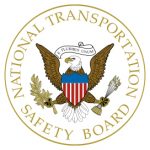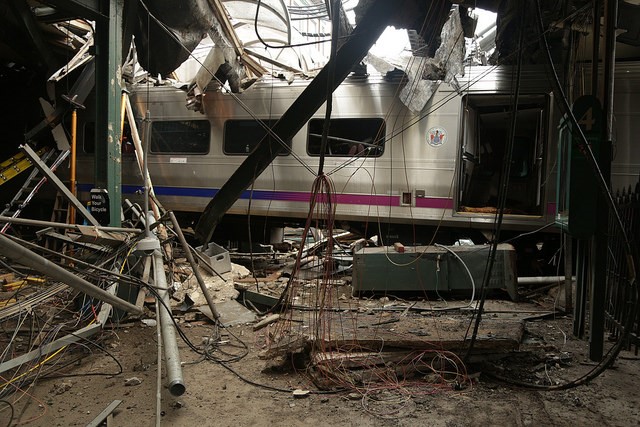New Jersey Transit (NJT) is claiming sovereign immunity after a victory in the case Karns v. Shanahan 18 months ago, which upheld NJT’s argument that it is a part of the state of New Jersey, not an independent agency, and as such is not responsible for employee injuries.
In a second, unrelated case in the 3rd Circuit Court of Appeals, an $824,000 ruling in favor of an injured NJT worker was overturned using that argument in late January. As a result, the state’s attorney general has requested that many workers’ injury lawsuits against the carrier be dismissed.
Representatives from SMART Transportation Division Designated Legal Counsel, including Rail Safety Coordinator Larry Mann, say that these rulings create a dangerous precedent and effectively nullify federal protections that all other railroad workers fall under.
NJT argues that it falls under the 11th Amendment of the U.S. Constitution and has sovereign immunity, meaning that its workers are entitled to the state’s workers’ compensation program.
However, Mann told the Courier Post that this is not the case, citing a U.S. Supreme Court ruling in 1917 where it was determined that railroad workers have no protections under state workers’ compensation laws because the Federal Employers Liability Act (FELA) preempts state laws.
“We’re not asking for anything new or novel,” SMART TD Designated Legal Counsel Robert Myers said in a hearing of the state’s Assembly Transportation and Independent Authorities Committee last week. “It’s the same thing as every other railroad in the country, and it’s all about safety.”
Assemblyman Dan Benson, the chairman of the Assembly Transportation and Independent Authorities Committee, has sponsored a bill (A4689) that would waive NJT’s claim to sovereign immunity. The bill is still in committee, but co-sponsors told NJTV News that they plan to fast-track it.
“It’s our responsibility here on the Transportation Committee and as public servants to make sure that we’re not leaving our workers in an unsafe environment without protections, and for things that extend to the general public,” Benson said in a committee hearing.
“It is vitally important that this legislation be enacted. Otherwise, there will be a crisis impacting all railroad employees injured or killed in this state,” SMART TD N.J. State Legislative Director Ron Sabol said at the hearing.
Click here to read more from the Courier Post or from NJTV News.
Tag: New Jersey Transit

The Sept. 29, 2016, accident on the New Jersey Transit railroad at Hoboken, New Jersey, killed one person, injured 110, and resulted in major damage to the station. The Jan. 4, 2017, accident on the Long Island Rail Road at the Atlantic Terminal in Brooklyn, New York, injured 108 people. Both accidents involved trains that struck end-of-track bumping posts and crashed into stations.
The NTSB found the two accidents had “almost identical” probable causes and safety issues. The board also determined that these safety issues were not unique to these two properties, but exist throughout the country at many intercity passenger and commuter passenger train terminals.
When operating a train into a terminating track, the engineer’s actions, or lack thereof, solely determine whether the train stops before the end of the track. According to the Federal Railroad Administration (FRA), there are currently no mechanisms installed in the U.S. that will automatically stop a train at the end of the track if the engineer is incapacitated, inattentive or disengaged. Some railroads have overspeed capabilities, including New Jersey Transit and the LIRR. However, as shown in these two accidents, once the engineer slowed the train to the prescribed speed, the system did not stop the trains before they reached the end of the track.
In addition to recommending safety-sensitive personnel be screened for obstructive sleep apnea, the board recommended the use of technology, such as positive train control (PTC), in terminal stations and improving the effectiveness of system safety program plans to improve terminal operations. The NTSB made two recommendations to New Jersey Transit, and the Metropolitan Transportation Authority (the parent company of the Long Island Rail Road) and two to the FRA.
“Today’s new recommendations, if acted upon, have the potential to eliminate end-of-track collisions,’’ Sumwalt said. “That translates to protection for passengers on trains, and for people standing on terminal platforms.”
The complete accident report will be available in several weeks. The findings, probable cause, safety recommendations, Chairman Sumwalt’s prepared remarks and PowerPoint presentations used in a board meeting are all available at https://go.usa.gov/xnscj.
The New Jersey Transit Hoboken accident docket, containing more than 1,100 pages of supporting factual material, is available at https://go.usa.gov/xnAGJ.
The Long Island Rail Road Brooklyn accident docket, containing more than 1,400 pages of supporting factual material, is available at https://go.usa.gov/xnAGe.
General Chairperson Stephen Burkert reports that New Jersey Transit is actively looking to hire locomotive engineers. Members who have questions can contact Burkert at sburkert@utulocal60.com.
Click here for instructions on how to apply.
Click here for the job posting on Monster.com.

Last year, NJT had the most accidents among the 10 biggest U.S. commuter railroads. Federal regulators have also issued safety-violation notices to the railroad in recent months.
Click here to read more from BloombergPolitics.
INDEPENDENCE, Ohio, January 9 — Two railroad labor unions have jointly filed a lawsuit to overturn a punitive New Jersey law that prohibits New Jersey Transit locomotive engineers from operating trains if their personal motor vehicle driver’s license is suspended.
The unions argue that the state law, signed by Governor Chris Christie in late August of 2016, is preempted by Federal law, specifically, the Rail Safety Improvement Act of 2008, and also by existing Federal Railroad Administration (FRA) certification requirements for locomotive engineers.
The lawsuit was filed jointly on January 9 by the Brotherhood of Locomotive Engineers and Trainmen (BLET) and the Transportation Division of the International Association of Sheet Metal, Air, Rail and Transportation Workers (SMART-TD).
“Current federal law and existing federal rail safety regulations already thoroughly address the treatment of railroad workers who have their personal motor vehicle licenses revoked for operating under the influence of alcohol or other banned substances,” BLET National President Dennis R. Pierce said. “The New Jersey state law is incompatible with the federal law and is a solution in search of a problem. It does nothing to make the railroad safer.”
Federal law provides for safety checks and regular re-checks on locomotive engineers’ personal driving records, and mandates counseling and/or treatment for locomotive engineers who are diagnosed as having an active substance abuse disorder. Workers who refuse or fail to comply with the federal law have their certification suspended. Those who comply with the federal law and the terms of federally-mandated substance abuse program are permitted to continue working in a safe manner.
The state law reads in part: “A person whose driver’s license is suspended or revoked for a violation of R.S.39:4- 50, section 2 of P.L.1981, c.512 (C.39:4-50.4a), or a law of a substantially similar nature in another jurisdiction shall not operate, during the period of suspension or revocation, a locomotive or train provided by the New Jersey Transit Corporation, or any public or private entity under contract to the corporation.”
“Safety of our members and the traveling public is our top priority,” said SMART-TD President John Previsich. “But this matter is heavily regulated in the Federal arena, with science-based programs and systems already established to address such issues. Introducing another layer of bureaucracy, with overly punitive measures that conflict with Federal law, will only serve to disrupt and interfere with the very effective programs already in place.”
# # #
The Brotherhood of Locomotive Engineers and Trainmen represents more than 55,000 professional locomotive engineers and trainmen throughout the United States. The BLET is the founding member of the Rail Conference, International Brotherhood of Teamsters.
The SMART Transportation Division is headquartered in the Cleveland suburb of North Olmsted, Ohio. It is a broad-based, transportation labor union representing about 125,000 active and retired railroad, bus, mass transit and airline workers in the United States. It is a division of the International Association of Sheet Metal, Air, Rail and Transportation Workers based in Washington, D.C.

Steve Burkert, SMART TD general chairperson; and Doyle Turner, SMART TD vice president; led the fight for a fair and equitable agreement while withstanding the unreasonable demands of NJT. After two Presidential Emergency Boards and numerous negotiating sessions, the SMART TD negotiating team reached an agreement that was overwhelmingly ratified by our members on NJT.
SMART TD President John Previsich said: “I want to commend General Chairperson Steve Burkert, SMART TD Vice President Doyle Turner, Alternate Vice President Anthony Simon and all of the members of the negotiating team for their efforts in bringing this round of negotiations to a satisfactory conclusion. The negotiating team, led by GC Burkert, was instrumental in carrying the wishes of our NJT members to the negotiating table and it is through their efforts that we were able to reach an agreement that was ratified by an overwhelming majority vote. It’s been a long battle for the New Jersey Transit members and now they will receive the wages and benefits to which they are entitled. This is a tremendous victory for NJT SMART TD members, and for our union brothers and sisters across the country.”
General Chairperson Burkert said: “It’s been a long, drawn-out process and I’m thrilled for my members and their families that we were successful in reaching an agreement that provides for financial stability going forward, especially during this very tough political time. I want to express my appreciation to the entire membership for their solidarity and support through this very difficult round of negotiations.”

National Legislative Director John Risch, New Jersey State Legislative Director Daniel O’Connell, LIRR General Chairperson Anthony Simon and many others speak out in support of labor at Saturday’s labor rally. The rally comes ahead of a possible March 13 strike and/or lockout at New Jersey Transit.


